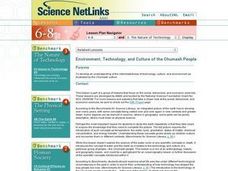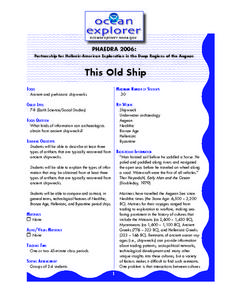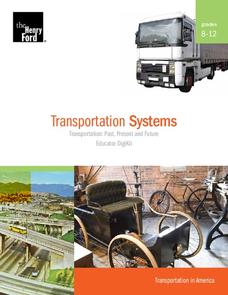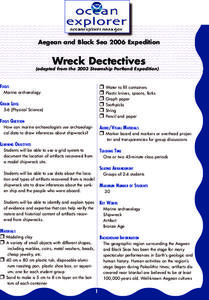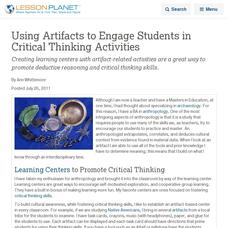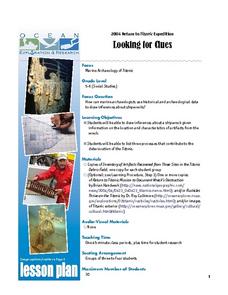Curated OER
Environment, Technology, and Culture of the Chumash People
Students develop an understanding of the interrelatedness of technology, culture, and environment as illustrated by the Chumash culture. They research the tribe and complete a table for the Chumash people describing their environment,...
Curated OER
Artifacts 1: What Can We Learn From Artifacts?
Sixth graders are introduced to artifacts and explore an online archaeological site to connect clues about how people once lived. In this deductive reasoning lesson, 6th graders participate in the stratigraphy game on Kids Dig...
Curated OER
Natural Dyes From Plants
Students investigate how natural dyes from plants was an expression of Native American cultures. They examine objects dyed from natural sources, conduct Internet research, and create their own dyes using various plant sources.
Curated OER
Natural and Recycled Materials Worksheet
In this teaching and learning through objects worksheet, middle schoolers find and research at least eight material culture artifacts made from different materials by using the websites listed on worksheet.
Curated OER
This Old Ship
Junior archaeologists will be able to describe shipwreck artifacts and the information they reveal. They work in small groups to reasearch wreckage features of different period ships, making this not only a science lesson, but a social...
Curated OER
Transparent Shoebox Dig
Take this simulated archaeological dig one layer at a time with your young pupils to encourage observation, critical thinking, and careful attention. Using a transparent box full of layers of sand and artifacts, pupils examine the...
Curated OER
For the Last 10,000 Years...
High schoolers study the National Estuarine Research Reserve System and discuss why they have important cultural artifacts. In this estuarine weather lesson plan students use the Internet and complete a worksheet.
Curated OER
Archaeology and Storytelling
Students identify and interpret both individual families and whole cultures learn about their pasts by collecting and analyzing stories and artifacts. Then they identify that not all archaeological finds readily reveal their history to...
Ocean Explorer
Looking for Clues
Upper graders become "shipwreck detectives" by studying the debris field from a shipwreck in the Aegean Sea which took place in the 700s. A website is accessed that gives specific information about the debris field, and pairs of...
Henry Ford Museum
Transportation Systems
Learners analyze the evolution of cultural attitudes through the lens of transportation, examining several artifacts, documents, and photographs. Topics covered include how American attitudes have influenced society's evolution into a...
Curated OER
Layer Cake Archaeology
Excavating cake? Why not! Kids spoon into some layers and artifacts during this tasty hands-on activity. The cake, a simulated archaeological dig, is the object of observation and discussion.
Curated OER
Back From the Future
Students pose as archaeologists, famous for their scholarly excavations, writing, and lectures about ancient cultures and are invited back to the 20thy century from the year 3000 to explore an archaeological sit, their classroom.
Curated OER
Wreck Detectives
Junior archaeologists examine types of artifacts from the Bronze Age on the internet. In collaborative groups, they create a story about a ship from this period and then construct a model of the ocean floor after their ship has sunk....
Curated OER
The Iron Cheesebox
Students describe the oxidation/reduction reactions that are involved in the corrosion of iron in seawater. In this marine sanctuary instructional activity students study the steps in conserving marine archaeological artifacts.
Curated OER
How Do We Learn About the Past?
Sixth graders discuss the role of an archaeologist as a class. After viewing photographs, they relate the objects found in their local area and Ancient Egypt. They draw a picture of an object that represents their own culture and gives...
Curated OER
To Dig or Not to Dig: The Stadium Showdown
Students examine an ethical public dilemma. In this cultural resource lesson, students role play to examine their personal beliefs regarding the protection of cultural resources. They evaluate possible actions they can take to protect...
Curated OER
Egypt's golden Empire
Students explore many of the key scientific and technological contributions made by the ancient Egyptians. Researched data is presented to the entire group.
Curated OER
Archaeology is ...
Students demonstrate the importance of context for learning about ancient people. They assess the importance of preservation of cultural resources. They exchange papers with a student in class. The students with the paper are responsible...
Curated OER
Using Artifacts to Engage Students in Critical Thinking Activities
Creating learning centers with artifact-related activities are a great way to promote deductive reasoning and critical thinking skills.
Curated OER
Digging Detectives
Students experience exploring an archaeological site utilizing various archaeological methods and techniques to help them synthesize multiple aspects of past life and culture to today. They explore what an archaeologist can learn from an...
Channel Islands Film
Once Upon a Time (Sa Hi Pa Ca): Lesson Plan 3
What was the most significant tool used by the Chumash? How did the environment make the tool possible? What group behaviors allowed the Chumash be be successful for thousands of years? After watching West of the West's documentary Once...
Curated OER
National Estuarine Research Reserve System
Students investigate the benefits of estuarine research reserves. In this National Estuarine Research Reserve lesson plan, students learn how to obtain information on the 26 reserve sites, they discuss the importance of the reserve...
Curated OER
Titanic: Looking for Clues
Students make inferences about a shipwreck based on the location of artifacts. They role play as marine archaeologists and list three processes that contribute to the deterioration of the Titanic.
Curated OER
Archaeology of the Future
Pupils view pictures of classmates' homes, make list of different objects in picture, and discuss what they can tell about place from evidence in picture. Students then observe artifact pictures, and read and complete artifact chart.
Other popular searches
- Cultural Artifacts in Japan
- Math Cultural Artifacts
- Cultural Artifacts Diversity
- American Cultural Artifacts
- Cultural Artifacts in Alaska
- Us Cultural Artifacts
- Korean Artifacts and Culture
- Cultural Artifacts in Math
- Recyclable Cultural Artifacts
